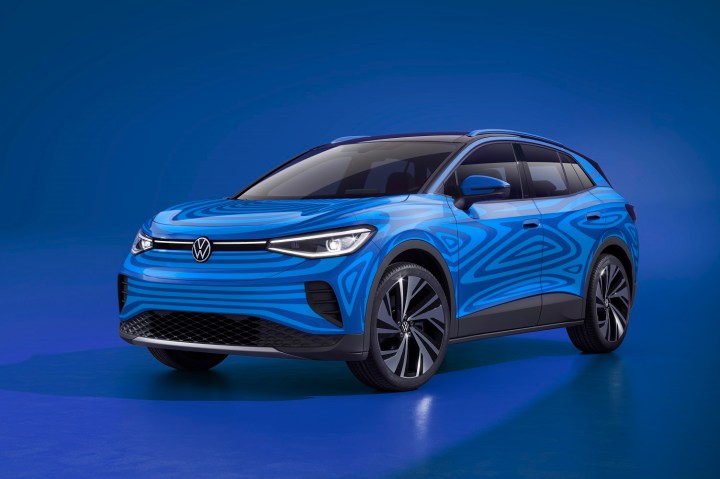The electric, Tiguan-sized ID.4 is a family-friendly crossover that will launch Volkswagen’s electrification offensive in the United States. It won’t make its full debut until later in 2020, but the German carmaker released images of a thinly camouflaged prototype to give us an idea of how the ID.Crozz concept has changed on its way to production.
The ID.4 rides on the same modular MEB platform as the ID.3, a Golf-sized hatchback not coming to America. It’s a highly flexible architecture Volkswagen developed in house from scratch specifically to underpin electric cars. The ID.Buggy that I drove in California in 2019 was also built on MEB, as were all of the ID-badged concepts shown over the past couple of years. The platform uses a single electric motor mounted over the rear axle in its standard configuration, but making it all-wheel drive is as simple as adding a second motor that spins the front wheels.
Although the aforementioned ID.Crozz concept served as a preview of the ID.4, the gallery released by Volkswagen confirms the model will arrive with a more conventional, less fastback-like roofline. The boxier silhouette and the compact electric powertrain should let designers carve out a stunningly spacious interior, but we haven’t seen it yet.
Many of the connectivity features found in the ID.3 will find their way into the bigger ID.4, and that’s great news. The infotainment system is intuitive to use, very smartphone-like in terms of layout and graphics, and internet-connected, so it’s able to receive over-the-air software updates when needed. I expected the ID.3’s augmented reality head-up display will also be available on the ID.4, making it one of the most tech-packed models in its category.
Volkswagen pledged to release the ID.4 in Europe before the end of 2020, but it might not arrive in American showrooms until the 2021 model year. Production will start in Europe, and Volkswagen is currently investing $800 million into upgrading its Chattanooga, Tennessee, factory to build the crossover there, too. It will compete in one of the most popular and fastest-growing segments of the industry so getting it right is crucial.
At least two additional electric models will join the ID.4 in Volkswagen’s American showrooms during the early 2020s. One will be the production version of the heritage-laced, Bus-inspired ID.Buzz concept.
Updated on March 3, 2020: Added the latest information about the Volkswagen ID.4.
Editors' Recommendations
- Volkswagen ID.4 vs Tesla Model Y
- 2021 Volkswagen ID.4 AWD first drive review: Gaining traction
- 2021 Volkswagen ID.4 first drive review: Lightning bug
- 2021 Volkswagen ID.4 electric car prototype drive: A crowd-pleaser
- 2021 Volkswagen ID.4 aims to (finally) bring electric cars to the masses









